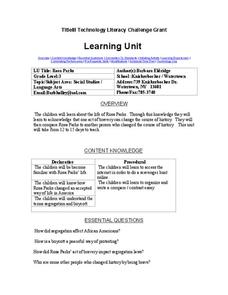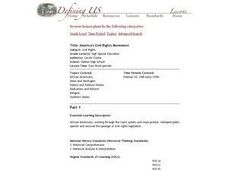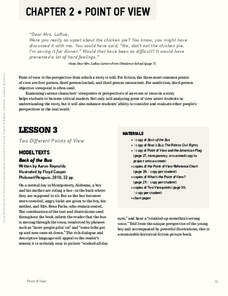Curated OER
Rosa Parks
Students complete a variety of written and discussion activities regarding Rosa Parks and the Alabama bus boycott and how they changed an accepted way of life in America.
Curated OER
Rosa Parks/Segregation
Students examine the role of Rosa Parks in ended segregtation in the South. Using new vocabulary, they observe the effects of segregation by being placed into different groups over a two day period. They discuss the feelings and emotions...
Curated OER
Riding with Rosa
Students examine a photo to experience history. In this teaching tolerance lesson, students view a photograph of Mrs. Parks sitting on the bus and place their own picture by hers. Students imagine that they were sitting on the bus with...
Curated OER
Before Rosa Parks: Ida B. Wells
The contributions of Ida B. Wells to the Civil Rights Movement are the focus of this social studies lesson. Middle schoolers read a handout regarding Wells, discuss the handout, and write about non-conformist behavior.
Curated OER
People and Their Place in the Community
Third graders search TDC database for images of famous people, such as Rosa Parks, Gandhi, Martin Luther King Jr., etc. They also retrieve information about their accomplishments, time frames, areas, and how they made a difference in...
Curated OER
What is the Role of Civil Disobedience Today?
Students examine the meaning and use of civil disobedience. They decide whether civil disobedience is a viable form of protest in contemporary times after studying the acts of Rosa Parks.
Curated OER
Rosa Parks Community Garden
Students explore gardening and nutrition in the Rosa Parks Community Garden. They work in stations to discuss food choices, the life cycles of plants, and mini-composting. After starting in one station, they rotate to try each activity.
Curated OER
Dear Mrs. Parks Teacher's Guide
Students read and respond to the book, Dear Mrs. Parks. In this African-American literature lesson plan, students read the text and examine several vocabulary words from the text. Students answer 11 discussion questions and participate...
Learning for Justice
Mary Church Terrell
Excerpts from an 1898 speech by civil rights activist Mary Church Terrell offers young scholars an opportunity to investigate how Black American women fought for civil rights long before Rosa Parks and the civil rights movement of the...
Curated OER
Martin Luther King, Jr.
Young scholars learn what goals Dr. Martin Luther King, Jr. had when he wanted to change the inequality of the United States.
Curated OER
The Bus Ride Teacher's Guide
Students examine and respond to the text, The Bus Ride. In this African-American literature lesson, students explore pre-reading questions that focus on fairness of laws. Students read the text based on Rosa Parks and answer 11...
Historical Thinking Matters
Spanish-American War: 5 Day Lesson
Nine historical documents, an interactive online notebook, and a fantastic opportunity for historical inquiry await your pupils in this 5-day lesson plan. Class members identify and discuss various causes for the Spanish-American War...
Museum of Tolerance
Making Lemonade: Responding to Oppression in Empowering Ways
An activity focused on tolerance encourages class members to consider how they might respond when they or someone else is the target of oppression and discrimination. After researching how some key figures responded to the anti-Semitism...
Alabama Department of Archives and History
Women of the Movement: Civil Rights Movement in Alabama
Many know of Rosa Parks involvement in the Civil Rights Movement, but who were other female leaders? The lesson focuses on female Civil Rights leaders and their achievements. Scholars complete research, participate in group discussions,...
Global Oneness Project
Repairing the Fabric of Democracy
During elections, headlines constantly lament the issue of low voter turnout. Help class members understand why this is such an important topic with relevant articles, a discussion of both sides of the issue, and a reflective essay.
Curated OER
Taking a Stand with Rosa Parks
Students discuss African-American history from slavery to the civil rights movement. They discuss individual people who shpaed history by reading their biographies and researching the age in which they lived. Studnets comprehend the...
Curated OER
Cultural Acceptance
Students are segregated into groups according to their clothing and experience first hand what it feels like to be a minority in everyday life. In this cultural acceptance lesson plan, students experience discrimination first hand....
Curated OER
America's Civil Rights Movement
Eleventh graders explore, analyze and study the background to America's Civil Rights Movement through the court system, mass protest, public opinion, political cartoons and legislation. They research Rosa Parks, Brown vs. Board of...
Curated OER
Genre Lesson: Autobiography
Start kids thinking about point of view and autobiographies by telling them a short story about your morning (first person), and then asking a volunteer to re-tell the story to you (second person). There are tips to help you tie this...
Curated OER
Before Rosa Parks: Early Grades Activity
Students read excerpts from an autobiographical work and retell scenes from the book. They consider the ways Susie King Taylor's autobiography displays character traits including courage, creativity, compassion and determination.
Curated OER
Before Rosa Parks: Upper Grades Activity: Frances Watkins Harper
Students analyze the rhetorical strategies Frances Watkins Harper used, such as tone, emotional appeal and descriptive language
University of Arkansas
Individuals Making a Difference
The focus of this, the third in a five-activity unit study of human rights, is on individuals who made a difference. Billy Bowlegs, Dr. Sun Yat Sen, Fannie Lou Hamer, Michi Weglyn, and Yuri Koshiyama are some of the people class members...
Scholastic
Point of View
The point of view in a story can dramatically change the story itself. Focus on finding the points of view in various reading passages with a language arts packet, which includes fiction and nonfiction text.
Center for Civic Education
The Power of Nonviolence: What Is Nonviolence? What Does It Cost?
Your young learners will delve into the language of primary source documents in order to identify the characteristics, benefits, and costs of nonviolence. The instructional activity includes a mix of activities, including an anticipatory...

























